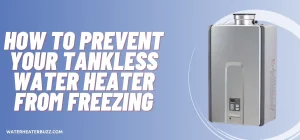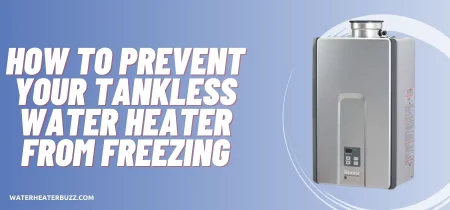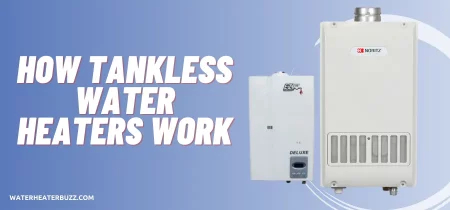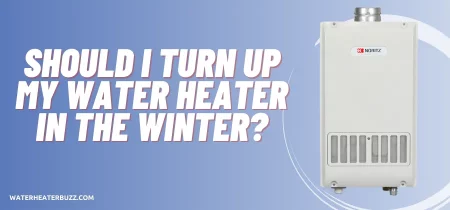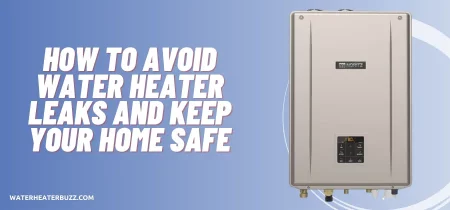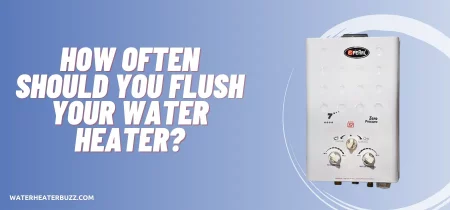Like any other piece of equipment, a water heater requires regular maintenance to keep running at its optimum. It is recommended that you drain your water heater at least once a year so that all the accumulated sediment will drain out.
Now the question is how to drain a water heater?
For a beginner, draining a water heater may seem like a very daunting task, but the truth is quite the opposite. It is just a small task that requires repetitive nature of steps, that will help you achieve the best results.
However, to further clarify things, I have prepared a step-by-step beginner’s guide on how to drain a water heater easily. To find out more, keep on reading!
How To Drain A Water Heater
Step # 01: Shut Off The Main Water Supply Valve
The very first thing that you should do, no matter what type of water heater you are using, is turn off the main water supply valve.
A complete shut-off of the water supply will ensure that all the accumulated water in the water heater drains out, which in fact is the whole purpose of this whole process.
Besides, this process will ensure that you know exactly when to stop. So, never forget to shut off the main water supply at the beginning of this process.
Step # 02: Turn Off The Main Power Switch
To carry out this process, you need to go through your manual at least once. It will give you a fair idea of how to go about this step depending upon the type of water heater you are using.
However, for those who have misplaced the manual or, for any reason, do not have access to it, follow the steps mentioned below.
For an electrical heater, you should unplug the main power switch or turn off the switch so that no electrical power is supplied to the water heater during the process.
On the other hand, for a gas water heater, either turn the thermostat to pilot or shut off the main gas supply to the heater.
Whatever you do, just make sure that no power is supplied to the heater during the entire process; otherwise, you may end up damaging the heating elements of the water heater.
Step # 03: Let The Water Time To Cool Off
The very next thing that you should be doing is let the water in your water heater cool off. You can achieve that in a lot of ways. For instance, you can turn on the hot water faucet until all the hot water runs out of the heater.
To avoid water wastage, you can consume that water in other ways such as by taking a hot water shower. You can also leave the water heater to cool off overnight and drain it the first thing in the morning.
No matter which alternative you opt for, make sure that you carry out this step, to avoid any physical injury while draining your water heater.
Step # 04: Attach A Hose To The Drain Valve
Now, all you have to do is locate the drain valve in your water heater. For this purpose, refer to the manual you got with your heater. It will help you locate the exact position of the valve and may include instructions on how to open the valve.
Usually, water heaters have their drain valves positioned at the backside. Once you locate the valve, simply attach one end of the garden hose to the drain valve and let the other end into the floor drain.
Step # 05: Open The Drain Valve
When the garden hose is properly positioned, all you have to do now is open the drain valve. The instant you turn it on, the water from the heater will start gushing out of the valve.
It may take a while before all the water comes out of the heater depending upon the amount of water inside the water heater and the sediment accumulation inside.
Step # 06: Flush The Tank With Freshwater
When all the water runs out of the water heater, you must turn on the main water supply valve to let the fresh water flush into the water heater and out via the drain valve.
This inflow of water will help get the sediment out of the tank. Repeat this process until the outflowing water turns clear.
Step # 07: Refill The Water Tank
Now, you just have to set the water heater back to its original state. Turn off the water supply, before turning off the drain valve tightly. Then, remove the garden hose.
Once the drain valve is tightly turned off, turn on the main water supply and let the tank refill. Once the tank is filled up, turn on the main power switch or gas supply.
Frequently Asked Questions
Can you drain your water heater yourself?
Yes, as a matter of fact, you can easily drain a water heater yourself. You just have to be careful about a few things and carry out the whole process in the correct order. However, make sure that you let out the hot water from the heater to reduce the chances of getting hurt in the process. So, to do that, simply let the hot water tap run for at least ten minutes. Then turn it off and attach a garden hose to the drain valve of the water heater and carry out the drainage process.
Final Thoughts
After going through this entire article, you have adequate information on how to drain a water heater yourself. Practice these simple steps a few times and you will attain perfection. However, make sure that you are extra careful because the water inside the heater is extremely hot and can cause severe burns if it contacts bare skin. Moreover, this entire process may take three to four hours so try to be very patient and don’t rush things!

